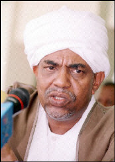Sudan president campaigning for peace, says Islamic law for the north is now guaranteed by all
 KHARTOUM, Sudan, June 01, 2004 (AP) — Sudan ‘s president began a campaign Tuesday to persuade his fellow northerners that the peace agreement signed with southern rebels last week is in their interests.
KHARTOUM, Sudan, June 01, 2004 (AP) — Sudan ‘s president began a campaign Tuesday to persuade his fellow northerners that the peace agreement signed with southern rebels last week is in their interests.
In a speech to more than 500 people in Friendship Hall, Khartoum, Omar el-Bashir stressed that, for the first time, the dominance of Islamic law, or Sharia, in the country’s north was accepted by all groups in Sudan as well as the country’s foreign partners.
“In the past, Sharia was applied by a decision we had taken,” el-Bashir said. “Now Sharia is being applied by a decision taken by the rebels, who had been fighting for a secular Sudan , by a decision taken by the IGAD and the IGAD states, and the IGAD partners, who used to call for secularism…”
The president was referring to Intergovernmental Authority for Development, or IGAD, the group of six East African states that mediated the peace process, and its partners, including the U.S. and the U.K.
“The identity of Sudan consists of the application of Sharia in the north and the application of norms in the south,” el-Bashir said in a speech that was frequently interrupted by the Arabic chant of “Allahu Akhbar,” or “God is great.”
“Norms” is the political jargon for non-Muslim faiths in Sudan , such as Christianity and African tribal religions.
The civil war, whose second phase began in 1983, has pitted the northern, Islamic-dominated government against rebels from the south, where the people are mainly of animist and Christian faiths. Although often simplified as a religious war, the conflict is fueled by historical disputes and competition for resources, including major oil reserves.
More than 2 million people have perished, mainly through war-induced famine. The peace accords provide for southerners to vote in a referendum on secession at the end of a six-year transition period.
The referendum – a concession that the government long resisted – has drawn criticism in the north.
Sudanese people “should protect this peace because in so doing they are preserving their identity,” el-Bashir said.
The rebel Sudan People’s Liberation Army had long opposed Sharia as the dominant legal system in the capital, Khartoum, but their negotiators eventually conceded this. In return, the accord provides guarantees for Christian and animist citizens who live in the north.
El-Bashir urged the Sudanese people to overcome the bitterness of the war, which has been Africa’s longest running conflict.
He asked people to remember how Sudan had overcome the first phase of the civil war, 1955-1972. He said northerners and southerners managed to come together after the 1972 peace even though there was no trust between them.
